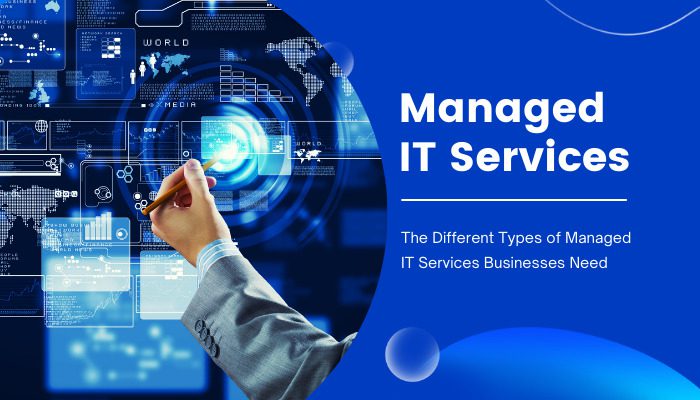As digital transformation continues to upset business as usual in all industries, it’s natural that keeping up would be a top-of-mind priority for more organizations. This fact, coupled with the numerous security breaches we have seen over the past few years, means choosing the right technological solutions and support partners can be one of the most critical decisions that a business makes.
Many organizations are turning to managed IT service companies to enhance their IT infrastructure and cybersecurity protections.
The Many Faces of Managed IT Services
The types of services a business outsources to an MSP depends on its needs.
The most basic level of service is managed IT infrastructure. These are the most fundamental services where the provider supports a company’s computers, servers, and workstations. Some services businesses can get at this level include software installation and integration, system monitoring, updates, and notifications for existing and emerging security issues.
Mid-level managed IT services entail the support of the business in addition to a range of complex technology and IT services. Once the managed IT service company sets up the infrastructure, it monitors it for warning signs and performance issues.
The IT support partner will keep all software and hardware up to date using security patches. It will also provide scaling features, allowing the business to expand or reduce the infrastructure depending on the needs of the business.
High-level managed IT services cover everything provided by the two levels above in addition to supporting your communication services, doing data analytics, ensuring wireless networks are secure, and providing software-as-a-service programs businesses can buy or lease.
Once a business has grown to a point where its IT infrastructure and services have become too convoluted and expensive to maintain, it is time to get in touch with a managed IT services company. But which services can businesses expect from these service providers?
Network and Infrastructure Management
A managed IT service provider can help your business handle all its networking and IT infrastructure. This includes setting up, running, and monitoring wide-area and local-area networks. The company might have an onsite infrastructure set up. This includes setting up all software and hardware at the business’s offices. This option is great for businesses that do not want to hire an entire in-house IT department.
Once they hire an MSP, their new partner will help set up mobile networking infrastructure. Such an option allows teams and employees to connect to the company’s network via wireless devices, whether in the office or wherever they may be in the future. The IT company might also set up a virtual private network for global teams and those working in the field.
With the growing popularity of remote work, businesses might also need managed cloud infrastructure services. These allow employees to collaborate and attend meetings via cloud-based software, without having to worry about on-premise technology problems. You might also have cloud storage options where remote teams access the files they need wherever they are in the world.
That last option works well with managed storage backup where teams and managers can upload and access information and assignments with the data protected through remote backups.
Managed Remote and Onsite IT Support Services
Knowledge workers spend on average of 2 weeks per year on issues with their computers, connections, or software. A managed IT service that provides support services has someone standing by to help staff deal with these issues and find a solution. The level of service will vary and can range from answering questions to sending someone to a location to deal with an issue.
Managed IT services are great for businesses of all sizes, especially those that do not want to hire an in-house IT department. Businesses can get different services from the IT company depending on their chosen package and needs, and these services can come in very handy depending on the business.
Cybersecurity Management
Business data is at greater risk than ever before, as malicious actors are becoming more efficient at breaching security protections. Because of this, every business needs security management features. These include anti-malware software, maintenance and patching, and application compatibility.
Anti-malware software helps keep networks protected from malicious software. Ensuring the latest patches are installed eliminates known vulnerabilities that malicious actors can use to attract a system.
Application compatibility ensures that all software and hardware being used by the company integrate well. This helps eliminate anything that can compromise the security of a business’s IT infrastructure.
Software-as-a-service (SaaS) Management
SaaS is software that is hosted and run on the cloud that a business pays for monthly or annually. The business gets unlimited access to the software while not having to pay for or worry about the infrastructure it runs on because the IT companies handle that.
The SaaS might be software the IT company has developed or that it sources from a third-party developer or vendor. The IT company handles all patches, updates, and maintenance, allowing business owners, teams, and managers to focus on more important tasks.
SaaS services also give businesses peace of mind in knowing all the software they use is safe and always available as long as it is paid for.
Telecommunications Service Management
Businesses can also buy IT communication packages. The first option in this package is data. This allows employees to send files and information regardless of the device anyone else is using and where they are located.
Voice services might include VoIP, which lets employees communicate one-on-one or in a group. This software and service works on both computers and smartphones and is much cheaper than other comparable services.
Video communication has become more essential as the number of people working remotely increases. Businesses can hire a managed IT service provider to install the necessary hardware and make an internet connection available so staff can communicate via video.
All these services help keep everyone in sync with each other, and businesses that want more can have the IT company establish a managed call center.
Data Destruction
There is a worrying number of people who do not think about what happens to their data whenever they dispose of a device. All data on a device should be destroyed in such a way that it would not be readable by anyone who gets a hold of the device.
Some managed IT companies offer data destruction services, especially if they were involved in the purchase and setup of a company’s devices. They will destroy the data and then dispose of the devices in a way that does not affect the environment.



































